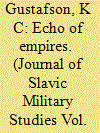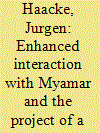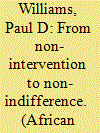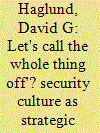|
|
|
Sort Order |
|
|
|
Items / Page
|
|
|
|
|
|
|
| Srl | Item |
| 1 |
ID:
101054


|
|
|
|
|
| Publication |
2010.
|
| Summary/Abstract |
While the Cold War is a memory, and Hillary Clinton and Sergei Lavrov have hit the 'reset button', recent spy scandals show that the United States and the West still do not have smooth relations with Russia. If we wish to understand Russia, we must understand its cultural origins, something we have failed to do so far. While Russia's behaviors often appear western, they do not share the same traditions of Rome and religious reformation. One can make more sense of Russian security and intelligence culture-as opposed to specific Communist or Post-Communist cultures-by tracing their common philosophical and historic roots back to their point of origin, between 500 and 1,000 years ago to the Byzantine Empire.
|
|
|
|
|
|
|
|
|
|
|
|
|
|
|
|
| 2 |
ID:
065488


|
|
|
| 3 |
ID:
108779


|
|
|
|
|
| Publication |
2011.
|
| Summary/Abstract |
The following exploratory case study analyses European Union's military involvement in the Democratic Republic of Congo in the framework of two operations: Artemis (2003) and EUFOR (2006). The European Union in this context is not regarded as a 'single actor' but as part of a system, including the member states and the United Nations. In order to bridge the gap between strategic culture and behaviour, it is proposed to broaden the scope of the strategic culture approach by taking specific interests and 'games' played by the actors across these levels into consideration. The analysis also suggests that two background features of the multi-level 'game' as part of the European Union's strategic culture should be especially recognized: the 'barrack yard syndrome' as a principle of behaviour influencing the question who of participates in the operation, and 'multilateral Caesarism' as a feature of the 'multilevel game' which limits parliamentarian control of decisions and may also have a major impact on decisions to launch a military operation in the framework of the EU.
|
|
|
|
|
|
|
|
|
|
|
|
|
|
|
|
| 4 |
ID:
191976


|
|
|
|
|
| Summary/Abstract |
Over the past two decades, the international community has devoted considerable attention to the human dimension of nuclear security. This trend is part of a more holistic approach to securing nuclear facilities, grounded in the concept of culture, that moves beyond the traditional focus of physical-protection measures. But what explains this shift and what does it entail? This article begins by demonstrating, through a series of real-life case studies, the potential for human factors to undermine nuclear-security systems. It then considers the rise and consolidation of “culture” as a concept used to better understand and organize international efforts to strengthen nuclear security. Nuclear-security culture is then explored in practice, drawing on a review of relevant initiatives as well as empirical research conducted by the authors at several UK nuclear sites. A number of likely challenges for developing an effective nuclear-security culture at the operational level are discussed, as is the value of the culture-focused guidance developed by the International Atomic Energy Agency. The article concludes that while nuclear-security culture has been widely promoted at the international level, there exists considerable scope for new initiatives to further strengthen engagement at the working level of industry.
|
|
|
|
|
|
|
|
|
|
|
|
|
|
|
|
| 5 |
ID:
077664


|
|
|
|
|
| Publication |
2007.
|
| Summary/Abstract |
This article employs the concepts of security culture and norm localization to explore some of the cultural dimensions of the African Union's (AU) security policies. After providing an overview of constructivist accounts of norm socialization in international relations, I use these insights to analyse the origins and development of the AU's security culture. The final two sections explore the ongoing process of norm localization in relation to the two most recent tenets of the AU's security culture: intolerance of unconstitutional changes of government and the responsibility to protect principle. An awareness of the uneven and contested nature of this process helps account for the fact that although these two transnational norms have been institutionalized in the AU Charter and endorsed by the United Nations, they have been internalized unevenly by the AU's member states. External advocates of these two norms would thus do well to help the continent's norm entrepreneurs build congruence between these norms and the AU's security culture.
|
|
|
|
|
|
|
|
|
|
|
|
|
|
|
|
| 6 |
ID:
074573


|
|
|
|
|
| Publication |
2006.
|
| Summary/Abstract |
The institutionalisation of security issues within the EU framework has allowed the central institutions, led especially by the High Representative, Javier Solana, and the departments attached to his office, to begin to establish a specifically European discourse on security, the threats posed to Europe and the principles that should underlie European reactions to them. The European Security Strategy agreed in 2003 has, in particular, provided a benchmark for European reactions and attracted constant references. That document, other declarations, and the growing number of EU missions within the framework of the EU's Security and Defence Policy allow for a dynamic interaction of discourse and practice. That dynamism, however, needs to be set against the EU's continuing under-achievement of its own declared defence capability goals, the existence of an alternative security discourse in NATO strongly enunciated by the United States and the continued dominance of national defence discourses.
|
|
|
|
|
|
|
|
|
|
|
|
|
|
|
|
| 7 |
ID:
108775


|
|
|
|
|
| Publication |
2011.
|
| Summary/Abstract |
Scholars interested in contemporary security and defence policy, in Europe as elsewhere, often seek refuge in conceptual havens, and the articles in this special issue are no exceptions. One of those sheltering spots has been dubbed security culture, while another fashionable resting place carries the label, 'strategic culture'. This article argues that attempts to draw a distinction between the two categories are superfluous, not to say meaningless, and that insofar as what we should call our concept, it really is a case of Tweedledum and Tweedledee. More important is the task of attempting to abstract policy significance from the complexity and definitional vagueness of the more 'senior' of the two concepts, namely strategic culture. This complexity and vagueness to the contrary notwithstanding, this article claims that strategic culture can be of some analytical use in highlighting the ways in which both context and character have played, and continue to play, a part in shaping states' orientation toward security and defence policy.
|
|
|
|
|
|
|
|
|
|
|
|
|
|
|
|
| 8 |
ID:
108535


|
|
|
|
|
| Publication |
2011.
|
| Summary/Abstract |
After the end of the Cold War, Japan became very active in its security policy. How
can we explain this phenomenon? This essay argues that (neo-) realist settings
(the end of the Cold War, the Taepodong missile launch) have triggered changes
in Japanese domestic security culture, which subsequently affected Japanese
security policy. In spite of rationalist theorists' criticism of the constructivist
approach for not being able to clarify independent and dependent variables, this
essay attempts to elucidate the relationship between security culture and policies
thereof. By utilizing "cultural process-tracing," this paper investigates how cultural
elements become linked and internalized into policymaker-level and illustrates
the causal relationship between these two.
|
|
|
|
|
|
|
|
|
|
|
|
|
|
|
|
| 9 |
ID:
189316


|
|
|
|
|
| Summary/Abstract |
The Japanese government led by Shinzo Abe passed the Security Bills in 2015. The passage of these bills drastically changed Japan’s passive stance in the security arena. Utilizing the context surrounding the Security Bills in Japan, the present research examines Japanese citizens’ attitudes and behavior toward security issues. In addressing this matter, this study focuses on the roles of war memories in Japanese society. Recognizing that war memories constitute an essential element of Japanese society in the post-World War II era, I present two hypotheses. First, one can expect that those who are deeply immersed in war memories tend to be opposed to the Security Bills. Second, it is possible to hypothesize that those who are extensively exposed to war memories tend to discuss security issues more actively. To test these hypotheses, I conduct an original survey in Japan that is specifically tailored for this study. A statistical analysis relying on the survey data verifies the second hypothesis although it fails to support the first one. By dissecting the processes through which war memories shape Japanese citizens’ attitudes and behavior in the security arena, this study significantly advances our understanding of Japan’s security culture. Findings from the statistical analysis generate critical implications that are essential in understanding the current discourse over security issues in Japan.
|
|
|
|
|
|
|
|
|
|
|
|
|
|
|
|
|
|
|
|
|